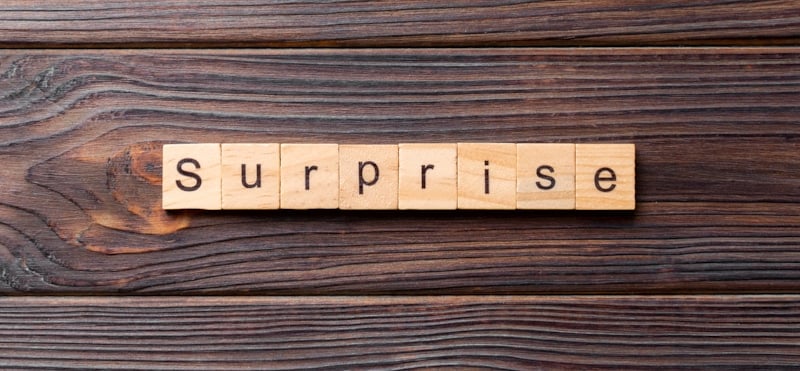Spelling is a complex activity. Good spelling requires developing many skills. This requires an understanding of the sounds that are contained in the words written on paper. Sometimes it is necessary to memorize many spelling rules and at the same time remember all the exceptions to those rules. Not to mention when we have to choose the correct word among several that sound alike. This selection is precisely the case that we will analyze today between “surprise” and “suprise.”
The word “surprise” means to be genuinely astonished by an event or situation that occurs unexpectedly. We also define it as a state of emotion that can be positive or negative, depending on the condition that produces it. In contrast, “suprise” is the incorrect spelling of “surprise.”
In the continuous writing process, we must check spelling whether we are preparing a work report, an email, or a love letter. We have to choose the right words, in the proper context, with the correct grammatical structure and spelling. Today we will enter into the depths of “surprise” and “suprise,” so buckle up as we go over all the relevant information about these two terms.

What Is The Definition Of The Word “Surprise”?
The word “surprise” is a term that some people love with passion, while others may have bitter memories. It all depends on what events we associate with this popular word. Below we will study its main definitions.
Surprise As A Verb
- To cause astonishment or wonder at something.
- To find or discover something unexpectedly or suddenly.
- To capture or assault without warning.
- To gift something to a person unexpectedly. Giving a gift to someone.
- To provoke someone to perform an unintentional action through a trick.
- To surprise a person in an act of indiscretion.
Surprise As A Noun
- The act of surprise. The act of taking someone by surprise.
- Any sudden or unexpected event; a gift.
- The feeling or condition of someone surprising another person. Astonishment.
- Something that causes or has characteristics of surprise.
- To take someone by surprise.
- To arrive suddenly at a place and without warning.
- To catch someone unexpectedly and off guard.
Surprise As A Geographic Location
- Surprise, Arizona.
- Surprise, Indiana.
- Surprise, Nebraska.
- Surprise, New York.
- Surprise Station, California.
What Is The Origin Of The Word “Surprise”?
The origin of “surprise” presents different versions depending on the source. We will now review the information available about this word.
Historical Events
- 12th century, from Old French “sorprendre” surprise meant “to reach, take, invade.” Also, from Latin, “prendre” meant “to seize, to take.”
- 13th century, from Old French “surprise,” surprise meant “to take by surprise.”
- 14th century, from Old French “surprize,” surprise meant “unexpected attack or capture.”
- In 1590, it meant “something unexpected” appeared.
- In 1600, it referred to the “sensation of astonishment caused by something unexpected” or when it appeared.
- In 1650, “to strike with astonishment” appeared.
- In 1690, “to take by surprise” appeared.
- In 1708, the “extravagant dish” appeared.
Understanding The Origin Of The Word “Surprise”
“Surprise” is one of the five commonly used English words ending in “prise.” The other words are “apprise,” “comprise,” “enterprise,” and “reprise.” This suffix comes from the French “prise,” which means “taken.” This French word comes in turn from the Latin “prehensus.”
This fact means that words ending in “prise” are related to apprehension and comprehension. These are words that came into English directly from Latin and had no influence from French.
The “sur” part of surprise also comes from French and means “above” or “beyond.” If a person is surprised, they are “surpassed” by something they did not see coming.
People first used the word surprise in English to refer to an unexpected attack or ambush by a group of soldiers.
Over time “surprise” took on a more positive meaning. For this reason, we now associate it with something we will enjoy, such as a birthday present we were not expecting. It is curious to know that the words people use most often in their regular vocabulary are “surprise” and “pleasant.”
What Is The Meaning Of The Word “Suprise”?
As we studied previously, “suprise” as a word does not exist. It is an incorrect spelling of the word surprise. This spelling error occurs by omitting the letter “r” that would normally be between the “U” and the “P.”
How Do People Use The Word “Surprise”?
Now that we know the meaning of the word “surprise,” it is elementary to know the most common uses. All the uses of “surprise” are related to the action of surprising someone or surprising oneself. Here are some of them.
- To indicate astonishment due to some specific event.
- To describe someone’s expression of astonishment.
- To indicate the action of giving an unexpected gift to someone.
The “Surprise Factor” In Storytelling
The surprise factor is a method used in storytelling to provoke a visceral and unexpected reaction in the audience. The technique consists of creating a story seeking to produce a specific perception of events, only to reveal it to be false, the reality being the complete opposite of the audience’s original perception.
Many authors use this technique in stories of humor, drama, suspense, mystery, and action. The more unexpected the story’s final twist, the more successful the application of the “surprise factor.” This unexpected outcome is not always positive or comic; sometimes, it can also be tragic.
In the humorous genre, experts believe that humor’s essence depends on the relevance of the content and the surprise factor. The explanation is straightforward: the audience always expects the themes of such plots to be familiar and exciting. But the climax of the humorous act comes with the plot twist, which is usually unrelated to what the audience expected.
These unexpected twists are the definition of the surprise factor. For this reason, knowing a joke beforehand is not funny since what is funny is that the outcome is something unique, something that no one saw coming.
Examples Of The Use Of The Word “Surprise” In Everyday Sentences
The truth is that the road we traveled to get here was full of surprises. As we are nearing the end of this post, we will show you simple examples of the word “surprise” in different sentences.
- My only intention was to give you a pleasant surprise. I never thought you would be scared like that.
- I have told you countless times that I do not like surprises, neither good nor bad.
- I was surprised when I was promoted from written content to editing.
- To Elisa’s surprise, her restructuring proposal did not have much support.
- The look of surprise on Susan’s face was indescribable.
- I can’t give Peter a surprise party if we can’t get him to come on Saturday.
- Sarah looked surprised when she saw the ad for a content manager, then focused on the qualifications to see if she could apply.
- It gets harder and harder to surprise Rachel. She always finds out at the last minute.
- The more I hear you, the bigger my surprise gets. I never thought I would listen to you say those words.
A Final Thought On The Word “Surprise”
We can’t hear the word “surprise” and remain indifferent. This word generates emotions every time we use it. The marvelous aspect is that we were able to review a lot of relevant and fun information simultaneously.
In this article, we studied the following aspects:
- We clarified the differences between “surprise” and “suprise.”
- We presented several definitions of “surprise.”
- We also reviewed the origin of this word in a fascinating historical tour.
- We looked at the uses of surprise and also learned about its usefulness in the narrative world.
- And finally, we finished with some practical examples in this term.
This journey of knowledge is training to strengthen the writing muscle and the communication muscle. It is a routine that we should continue to practice regularly to benefit our use of the language.
Shawn Manaher is the founder and CEO of The Content Authority. He’s one part content manager, one part writing ninja organizer, and two parts leader of top content creators. You don’t even want to know what he calls pancakes.


